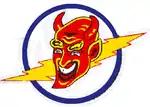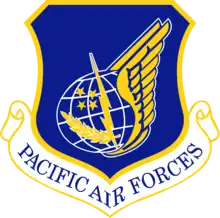| 40th Flight Test Squadron | |
|---|---|
 3247th Test Squadron F-16A Fighting Falcon[note 1] | |
| Active | 1940–1970; 1971–1982; --present |
| Country | |
| Branch | |
| Role | Flight Testing |
| Part of | Air Force Materiel Command |
| Nickname(s) | Fighting Fortieth (1959–1982) |
| Engagements | Southwest Pacific Theater Korean War[1] |
| Decorations | Distinguished Unit Citation Air Force Outstanding Unit Award Philippine Presidential Unit Citation Republic of Korea Presidential Unit Citation[1] |
| Insignia | |
| 40th Flight Test Squadron emblem[note 2][1] |  |
| 40th Fighter-Interceptor Squadron emblem[note 3][2] |  |
| 40th Pursuit Squadron emblem[note 4][1][3] |  |
The 40th Flight Test Squadron is a United States Air Force unit. It is assigned to the 96th Operations Group, based at Eglin Air Force Base, Florida.
History

"Combat in Southwest and Western Pacific, 2 June 1942 – 14 August 1945. Served in the occupation force in Japan, 1945–1950. Combat in Korea, 8 July 1950 – 25 May 1951. Air defense in Japan and Korea, June 1951 – June 1965. Trained cadres for transfer to Southeast Asia, 1966–1969. Not manned, 10 May 1969 – 15 October 1970 and 1 June 1972 – 30 April 1982."[1]
Conducted test and evaluation missions, using the various aircraft, 1982–present.
In 2022, the squadron added the Kratos XQ-58A Valkyrie to its inventory. This semi-autonomous unmanned aerial vehicle is capable of determining an optimal mission flight path based on inputs from ground stations or airborne fighter aircraft. Testing will be led by the Autonomous Aircraft Experimentation Team.[4]
Lineage
- 40th Tactical Fighter Squadron
- Constituted as the 40th Pursuit Squadron (Interceptor) on 22 December 1939
- Activated on 1 February 1940
- Redesignated 40th Fighter Squadron on 15 May 1942
- Redesignated 40th Fighter Squadron, Single Engine on 20 August 1943
- Redesignated 40th Fighter-Interceptor Squadron on 20 January 1950
- Redesignated 40th Tactical Fighter Squadron on 20 June 1965
- Inactivated on 15 October 1970
- Activated on 1 October 1971
- Inactivated on 30 April 1982
- Consolidated with the 3247th Test Squadron on 1 October 1992 as the 40th Flight Test Squadron[1]
- 40th Flight Test Squadron
- Designated as the 3247th Test Squadron and activated on 25 June 1982
- Consolidated with the 40th Tactical Fighter Squadron as the 40th Test Squadron on 1 October 1992
- Redesignated 40th Flight Test Squadron on 15 March 1994[1]
Assignments
- 31st Pursuit Group, 1 February 1940
- 35th Pursuit Group (later 35th Fighter Group, 35th Fighter-Interceptor Group), 15 January 1942 (attached to 35th Fighter-Interceptor Wing, 15 January–14 July 1954 and 8 October 1956 – 1 July 1957)
- 41st Air Division, 1 October 1957 (attached to 3d Bombardment Wing, 1 December 1961 – 31 May 1962
- Tactical Air Command, c. 17 June 1965
- 33d Tactical Fighter Wing, 20 June 1965 – 15 October 1970
- 355th Tactical Fighter Wing, 1 October 1971 – 1 June 1972
- 35th Tactical Fighter Wing, 1 June 1972 – 30 April 1982
- 3246th Test Wing, 25 June 1982
- 46th Test Wing, 1 October 1992
- 46th Operations Group, 8 September 1993[5]
- 96th Operations Group, 1 October 2012 – present[6]
Stations
|
|
Aircraft
- Bell P-39 Airacobra, 1941–1944
- Republic P-47 Thunderbolt, 1944–1945
- North American P-51 Mustang (later F-51, 1945–1950, 1950–1953
- Lockheed F-80 Shooting Star, 1950, 1953–1954
- North American F-86D Sabre, 1953–1961
- Convair F-102 Delta Dagger, 1960–1965
- McDonnell F-4 Phantom II 1965–1969, 1982–present
- LTV A-7 Corsair II, 1971–1972
- Fairchild Republic A-10 Thunderbolt II, 1982–present
- McDonnell Douglas F-15 Eagle, 1982–present
- General Dynamics F-16 Fighting Falcon, 1982–present
- General Dynamics F-111 Aardvark, 1982–1996
- Northrop T-38 Talon, 1982–present
- North American T-39 Sabreliner, 1982–unknown
- Lockheed C-130 Hercules, 1982–present
- Bell Boeing CV-22 Osprey, 1982–present
- Bell UH-1 Huey, 1982–present[1]
- Boeing F-15EX Eagle II, 2021-present[8]
- Kratos XQ-58A Valkyrie, 2022–present[4]
See also
References
Notes
- Explanatory notes
- ↑ Aircraft is General Dynamics F-16A block 15 serial 80-573 armed with an AIM-9 Sidewinder missile and a cluster weapon on 12 May 1986. This aircraft now on display at USAF Armament Museum at Eglin AFB.
- ↑ Approved 27 July 1983.
- ↑ Approved 9 July 1959.
- ↑ Approved 19 June 1941.
- Citations
- 1 2 3 4 5 6 7 8 "Factsheet 40 Flight Test Squadron". Air Force Historical Research Agency. 11 December 2007. Retrieved 28 February 2018.
- ↑ Maurer, Combat Squadrons, p. 187-188
- ↑ Hubbard, p. 720
- 1 2 Helfrich, Emma (11 November 2022). "XQ-58A Valkyrie Drone Has Joined Eglin Air Force Base's Test Wing". The Warzone. Retrieved 12 November 2022.
- ↑ Assignment information in Factsheet, 40 Flight Test Squadron, except as noted.
- ↑ Haulman, Daniel L. (4 December 2017). "Factsheet 96 Operations Group (AFMC)". Air Force Historical Research Agency. Retrieved 1 March 2018.
- ↑ Station information in Fact Sheet 40 Flight Test Squadron excpt as noted.
- ↑ AirForces Monthly. Stamford, Lincolnshire, England: Key Publishing Ltd. May 2021. p. 7.
Bibliography
![]() This article incorporates public domain material from the Air Force Historical Research Agency
This article incorporates public domain material from the Air Force Historical Research Agency
- Hubbard, Gerard (1943). "Aircraft Insignia, Spirit of Youth". The National Geographic Magazine. National Geographic Society. LXXXIII (6): 718–722. Retrieved 1 September 2017. (subscription required for web access)
- Maurer, Maurer, ed. (1983) [1961]. Air Force Combat Units of World War II (PDF) (reprint ed.). Washington, DC: Office of Air Force History. ISBN 0-912799-02-1. LCCN 61060979. Retrieved 17 December 2016.
- Maurer, Maurer, ed. (1982) [1969]. Combat Squadrons of the Air Force, World War II (PDF) (reprint ed.). Washington, DC: Office of Air Force History. ISBN 0-405-12194-6. LCCN 70605402. OCLC 72556. Retrieved 17 December 2016.
- Ravenstein, Charles A. (1984). Air Force Combat Wings, Lineage & Honors Histories 1947–1977. Washington, DC: Office of Air Force History. ISBN 0-912799-12-9. Retrieved 17 December 2016.



.svg.png.webp)